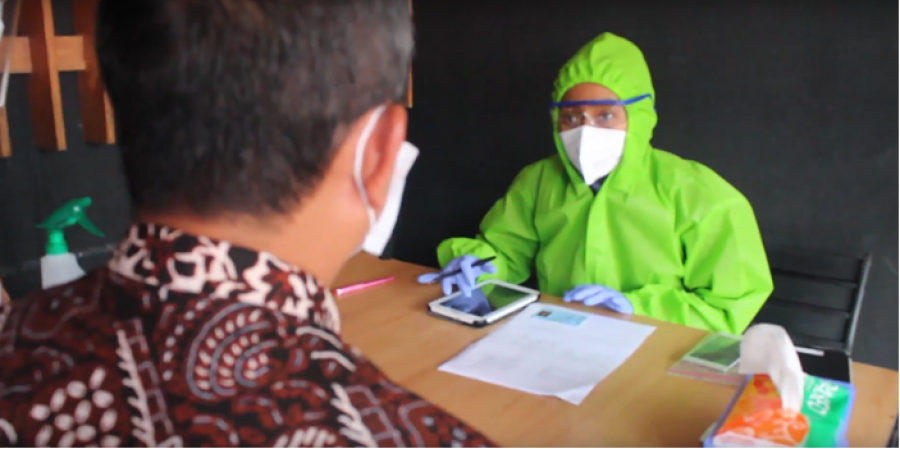Research funding boost to help reduce the impacts of COVID-19 across low- and middle-income countries
19 October 2020 London School of Hygiene & Tropical Medicine London School of Hygiene & Tropical Medicine https://lshtm.ac.uk/themes/custom/lshtm/images/lshtm-logo-black.png
Their work will focus on the impact of the virus on primary healthcare, and treatment for diseases such as TB and HIV, monitoring the role of children in COVID-19 transmission in low-income settings, and promoting health and safety in traditional food markets.
The grants forms part of a funding package from National Institute for Health Research (NIHR), in partnership with UK Research and Innovation (UKRI), which is supporting research which spans more than 18 countries across Africa, South America and South East Asia with a total of nearly £7.6 million of funding.
Mitigating the indirect effects of COVID-19 on tuberculosis and HIV care in Indonesia
Professor Virginia Wiseman, and Professor Ari Probandari from University of Sebelas Maret, have been awarded £790,000 for an 18-month project to assess the impact of COVID-19 on the delivery of, and access to, TB and HIV care, with a particular emphasis on highly vulnerable populations. The researchers hope this will inform mitigation strategies in Indonesia to ensure continuity of care for TB and HIV patients, and ensure Indonesia does not lose ground on the major advances it has made towards the control of these diseases.
The research will be conducted with partners from the University of Gadjah Mada, University of New South Wales Sydney, Indonesian Ministry of Health, and the University of Indonesia.
Household transmission and immunity in a low-resource community in Rio de Janeiro
Dr Chris Smith is receiving over £580,000 for a project led by the Oswaldo Cruz Foundation to study the household transmission dynamics of SARS-CoV-2 in a favela in Rio De Janeiro, Brazil, in order to estimate how much of its population has immunity against the virus.
The researchers will examine and test for COVID-19 in a sample of children and their families from one of the poorest neighborhoods of the city, with regular follow-up visits over two years.
The researchers hope to understand the role of children in transmission within families and communities, particularly in crowded living conditions.
The impact of COVID-19 on primary health care service in Tanzania, Sierra Leone and the Democratic Republic of Congo
£853,000 funding has been awarded to Dr Kate Gallagher, with partners from Institut National de Recherche Biomédicale in the Democratic Republic of Congo, the University of Sierra Leone, and the Mwanza Intervention Trials Unit within the National Institute for Medical Research, Tanzania. The research team aim to investigate the impact of the COVID-19 pandemic on primary healthcare providers and patients in three distinct settings in Democratic Republic of the Congo, Tanzania and Sierra Leone.
Reduced attendance of services such as immunisation, antenatal care, and family planning could have substantial collateral damage in areas of health care unrelated to COVID-19. The researchers hope that this project will inform the responses of Ministries of Health in the respective countries to ensure essential services continue to be delivered, and to respond to both the present COVID-19 crisis and future large outbreaks.
Promoting health and safety in traditional food markets to fight COVID-19 in Peru and Bolivia
Professor Punam Mangtani and partners from the Royal Veterinary College, Universidad Peruana Cayetano Heredia, Universidad Nacional Mayor de San Marcos and Universidad Mayor de San Simon, are receiving over £745,000 for a project to reduce COVID-19 transmission in four markets in Sacaba, Bolivia, and two in Huancayo, Peru. The project will support the mitigation measures involving both market sellers and buyers, and inform similar plans elsewhere through the development of a user-friendly tool that will be made available online.
In collaboration with health services in Bolivia and Peru, the researchers will promote actions such as early detection and follow-up of COVID-19 infections for market sellers and their families. They aim to use the data from this high-risk population to understand COVID-19 infection, and develop materials to support sustainable food markets.
LSHTM's short courses provide opportunities to study specialised topics across a broad range of public and global health fields. From AMR to vaccines, travel medicine to clinical trials, and modelling to malaria, refresh your skills and join one of our short courses today.